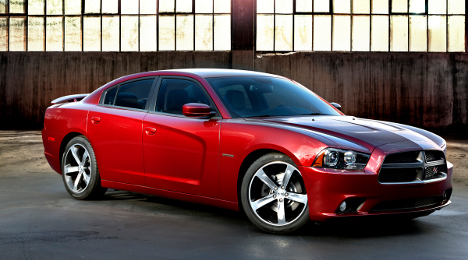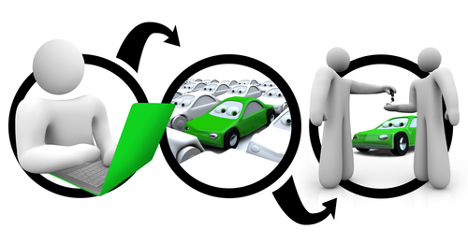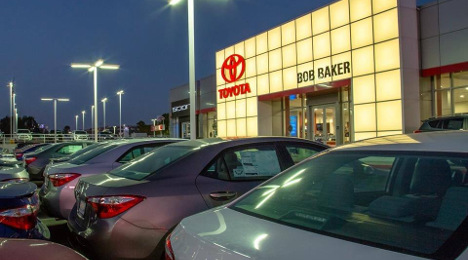A recent Customer Satisfaction Pulse Study conducted by BARE International indicated that more than 40 percent of vehicle-sales conversations do not gather key information. The research found that dealership personnel didn’t gather information such as what the buyer is looking for, how the vehicle will be used and how much a buyer is comfortable spending.
The firm explained this Pulse Study was conducted to gain insights from an everyday customer´s point of view.
Three major automotive brands — Jeep, Toyota and Ford — were evaluated across 10 countries. The study investigated five relevant touch-points of the customer journey:
—Pre-visit telephone call
—Arrival at the dealership
—Sales advisor interaction
—Sales closing
—General impressions and recommendations
According to BARE president Mike Bare, the overall results show clear indications for areas of improvement during the sales process.
“We consult with several automotive brands. Our goal was to conduct a brief pulse study to give our current and potential clients insight into how their customers experience the sales process,” Bare said. The results show some clear industry indicators.”
To download the benchmark report, go to www.bareinternational.com/global-automotive-pulse-study/.
Imagine you’re a car shopper.
Like many of your peers these days, you’re doing most of the car-shopping process — researching the vehicle, comparing prices, reading dealer reviews, checking out history reports, etc. — on your smartphone.
You spot a dealership you want to look up. Which of the two URLs is going to be easier to type into the URL bar: JoeSmithofMontana.com or Joes.cars?
Heck, which one is going to be easier to remember?
That’s part of the thinking behind Cars Registry, which launched auto-specific domain extensions .Cars, .Car and .Auto on January 20. Cars Registry is the registry operator for those domain names and was founded last year by XYZ and Uniregistery.
“Now there are more car-shoppers that are researching and buying cars on their mobile devices … if you’re JoeSmithofMontana.com, that’s going to take 10-20 seconds to type into your URL bar,” Cars Registry chief operating officer Mike Ambrose said in an interview here at the NADA Convention & Expo. “If you’re Joes.cars, it gives users a quick, easy access to your website. And it really ensures that branding, so visitors don’t get confused.”
Ambrose added: “We want dealerships to have the ability to secure that one word or that easy-to-remember domain name, so their visitors can easily access their site, because the domain name is the foundation of your digital marketing. And if dealerships are sending thousands of dollars on SEM and digital marketing activities, they want to be driving traffic to URL that makes sense, that’s short, that’s memorable. And that’s the first opportunity that we want to give dealerships.”
Since the launch, there has been an array of auto business types who have started using the domain names. That includes dealer groups, individual dealerships, tech companies like Google and Apple and automakers.
Non-automotive companies that have a presence in automotive are able to use it build website on auto-specific domain, cater specifically to their automotive offering
As for dealers specifically, Ambrose said hundreds registered domain names and at the time of this interview at NADA Convention & Expo, between 20 and 30 had had moved their entire website over to new domain name.
“This opportunity allows them to register their first-choice domain name that’s actually automotive specific. So if you’re JoesChevyInMontana.com – a four-word dot-com domain name – you could get Joes.cars or Joes.auto,” Ambrose said. “Something really short, memorable, mobile-friendly. It’s like a reset on the Internet name space, and dealerships can finally get the domain name that they’ve always wanted.”
There’s also a regional benefit to this, he said, where dealerships can “own” their city or region. For instance, he said, a Toronto dealership could get Toronto.cars or Toronto.auto.
“So, they can actually build a new website on this regional domain name and start to get leads for organic keywords relating to that search term,” Ambrose said. “Google puts preference on exact-match domain names.”
He gives the example of the Kansas-based Schofield Automotive, which registered Wichita.cars.
Ambrose added: “It’s a digital marketing asset that dealerships are using to get more customers in the door through Web leads.”
So, say you’re a dealer and you get a new .cars or .auto extension. What about the old website?
“Dealerships can either redirect their new domain name to their existing website, for defensive purposes and to protect their mark, so they can redirect it to their dot-com domain name. But we recommend that they do the reverse; so they redirect their old legacy dot-com domain name to their new domain name,” Ambrose said. “Because we’re seeing that dealerships see improvements in their search-engine ranking by switching over to the new domain name.
“And Google’s actually giving preference to the new automotive domain endings as opposed to the old dot-com domain ending, which could be for any business, whether it be a spammer or a photographer or a yoga instructor,” he added. “Anyone could be on a dot-com. “
Typically, only an auto-related business would buy a dot-auto domain name, for example, Ambrose said. And the company aims to ensure there is “only clean activity in our name space,” he said.
Fiat Chrysler Automobiles and shopping website CarGurus announced an agreement on Wednesday that provides the automaker’s franchised dealers an opportunity to advertise and post their certified pre-owned vehicle inventory on the CarGurus site.
Executives highlighted the agreement puts dealer CPO vehicle inventory in front of 20 million monthly unique automotive shoppers on the CarGurus website and gives FCA dealers access to the platform's top-performing lead generation and display advertising programs.
“As our dealers drive continued growth with CPO, it’s important that we support their efforts to get these vehicles in front of as many shoppers as we can," said Eric Swanson, head of certified pre-owned vehicles at FCA US.
“In partnering with CarGurus, we are opening a new channel to expose these great vehicles to highly engaged buyers,” Swanson continued. “We’re confident that CarGurus will help us generate quality leads for our stores and tell the CPO story in ways we never could before.”
Founded in 2007, CarGurus uses technology and data analysis to help consumers search their local market for the best vehicle deals, and then connects shoppers with listing dealerships. CarGurus works with dealers and OEMs to incorporate their inventory feeds on the site, and offers dealerships a range of high-performance lead generation and audience extension advertising packages.
“We are excited to bring more FCA US certified pre-owned vehicle choices and brand information to CarGurus shoppers, and we look forward to working with FCA US dealerships to help them reach our audience with the most efficiency and impact,” said Frank Weishaupt, senior vice president of audience sales at CarGurus.
“There's no question that CPO is becoming an important consideration for car buyers, and aligning with brands like FCA to tell their CPO story allows us to help our users make the best buying choices,” Weishaupt continued.
Dealers interested in learning more about CarGurus free and paid subscription programs should contact the FCA US Certified Pre-Owned Vehicle group.
Five trends uncovered in new research from CDK Global reinforced how much vehicle shoppers are willing and likely to start the buying process online.
In a recent survey, CDK found that nearly 70 percent of shoppers expected to find the ability to configure a payment on a dealership website, and 83 percent indicated that online buying technology would help them narrow down their vehicle choice and determine what is affordable.
Two other key findings from the survey include:
— 80 percent of shoppers say they would likely configure a payment online
— 60 percent said they would configure a payment and provide contact information
Also of note among those shoppers surveyed, more than half said they would configure a payment and start the credit process.
The research comes soon after CDK recently introduced an online vehicle buying solution for dealers in the United States — CDK Connected Store.
The new solution can provide a personalized and seamless experience for customers and flexibility regarding how much information they have to enter prior to visiting the dealership, from simply configuring a potential payment to actually starting the credit process. The solution can fully integrate with other CDK solutions, including Sales Velocity and dealer websites.
“Consumers have clearly indicated that they expect dealers to offer the ability to start the car buying process online," said Bob Karp, president of Automotive Retail North America at CDK Global.
“Interestingly, our research found that among those same consumers, nearly 60 percent felt more comfortable starting this process on a dealer's website compared to third-party sites,” Karp continued. “Dealers have a big opportunity to improve trust with this new technology, and to reduce the purchase time.”
Through a four-step process, CDK estimates that customers and dealers can save up to 90 minutes in the car buying process though the Connected Store solution. Customers can complete key areas of the deal structure including:
— Select a down payment. Customers can enter how much they would like to put down on their potential vehicle purchase.
— Determine trade-in value. Through Edmunds.com, users can estimate the value of their trade-in. They can subtract their current loan amount from the value of their current car.
— Calculate taxes and fees. Customers can determine the taxes and fees based on their address.
— Obtain credit information. When customers enter their information they can run their credit and determine their score and credit tier. Alternatively, customers may simply estimate their credit rating. They can then select finance or lease options, including terms and miles for the lease.
“What makes our solution unique is that it bridges the online experience seamlessly into the store,” Karp said. “The integration with the DMS and our desking solution also helps ensure that the consumer and the dealer have payment information that matches the online quote.”
CDK's Connect Store solution is currently available to dealers with both a CDK-provided website and a CDK DMS in the United States.
For more information, visit www.cdkglobal.com/connectedstore.
Enterprise Car Sales now has four locations in the nation’s third-largest metropolitan area.
The company announced last week that it has opened a store in Palatine, Ill., its fourth location in the Chicago area.
The store, which opened to the public in March, is a nearly 5,700-square-foot facility located on a three-acre lot. It can house more than 100 vehicles in inventory and has an Enterprise Rent-A-Car branch on site, as well.
“The steady growth we’ve witnessed in the Chicago region shows there’s clearly a high demand for quality used car-buying services in this market,” said Greg Tosch, sales manager in the Chicago area. “At Enterprise, we believe purchasing a car should be pleasant – not stressful.
“Our investment in the Palatine location allows us to offer even more Chicagoland customers the ease and convenience of a negotiation-free used car-buying experience.”
Greg Miller is embarking on his own dealership journey.
Independent of the Larry H. Miller Group of Companies (LHM Group), Greg Miller announced the acquisition of his first dealership on Wednesday with the purchase of Bob Baker Toyota in San Diego. This dealership will be renamed Greg Miller Toyota and will be operated under his new enterprise, Greg Miller Automotive San Diego.
“It has been a dream of mine for nearly 30 years to have my own dealership,” Greg Miller said. “When an associate at Toyota approached and encouraged me to pursue this opportunity, I realized this was a way to fulfill my dream and to continue to be a part of the community I love here in Utah.”
Miller will continue to be actively involved on the LHM Group board of directors and in serving as the Utah Jazz representative on the NBA Board of Governors. He will maintain his Salt Lake City residence and will continue to also serve in several religious and civic capacities, including on the board of the Utah Office of Tourism.
Miller has more than 30-years of experience in the automotive industry. He began his career by working as a lot attendant at his parents’ first store, Toyota of Murray. Over the years, he has held a variety of management roles within dealerships and the LHM Group.
“Greg’s new venture allows him to embrace his entrepreneurial side while remaining deeply committed to his LHM Group board position and the Utah community. He has our family’s full support as he pursues this opportunity,” said Gail Miller, owner of LHM Group.
Greg Miller elaborated more about what prompted this decision.
“I’m excited to begin this new venture in San Diego with Toyota, a brand I have decades of experience and familiarity with,” he said. “Seller Bob Baker is a pillar of the San Diego community and I’m pleased to continue to carry on Bob and my family’s traditions of doing business the right way and giving back in the community.”
Miller considers employees the foundation for a great customer experience, and with this acquisition, current employees will transition with the store.
“Greg’s reputation, his business style and his philanthropic nature convinced me that he was the right person to purchase my Toyota dealership,” Baker said. “I know my Toyota employees and customers will be well cared for, and I look forward to continuing my focus on community giving.”
The newly named Greg Miller Toyota is located at 6800 Federal Blvd. in Lemon Grove, Calif.
Editor's Note: This updates the April 15 story with updated data and clarifications from NADA.
There were 18.9 million used-car sales (including retail and wholesale) by the franchised dealership body last year, of which 14.6 million units were retailed.
That’s according to the latest NADA DATA report from the National Automobile Dealers Association, a portion of which was shared with the media.
The average retail selling price on their used cars was $19,397, NADA said.
There were 16,545 franchised dealerships in 2015. Their total revenue — including new-car sales, used sales, parts and service sales — came in at $862 billion, up 6.9 percent year-over-year-year. This was a record sum, according to NADA.
Used sales in 2016
According to figures from NADA cited in the latest Kontos Kommentary report, retail used-car sales from franchised dealers dipped 12.5 percent year-over-year in March (with their independent counterparts up 0.6 percent).
However, Tom Kontos — the author of the report and chief economist at ADESA — said the declines could perhaps have been driven by where Easter fell on the calendar this year (March 27).
He also points out in the report that independents and franchised dealers both showed major month-over-month gains in used-car sales during March.
Franchised dealers increased their retail used sales by 11.9 percent year-over-year in February (independents were up 15.5 percent), Kontos said in an earlier report, again citing NADA.
Interestingly enough, though, franchised and independent dealers were down sharply month-over-month in both January and February, he said.
As for January, franchised dealers increased used sales 9.9 percent year-over-year, with independents jumping 10.5 percent. Compared to December, both were off more than 30 percent.
It hasn’t even been a month since the National Automobile Dealers Association hosted its annual Convention & Expo in Las Vegas, but NADA’s staff is already looking ahead to the 2017 event in New Orleans.
On Tuesday, NADA issued a call for 2017 convention workshop proposals, which the association described as one of the event’s main attractions. The association tabulated that nearly 16,200 participants, which included franchised dealers, dealership managers and industry professionals, attended workshop sessions at last month’s convention in Las Vegas.
The deadline to submit a workshop proposal is May 16. For detailed instructions on how to submit a workshop proposal, go to this website.
For potential workshop presenters who want to sharpen their proposals, NADA will be hosting a webinar, “Tips for Submitting a Great Workshop Proposal,” at 1 p.m. (EDT) on April 20. Registration can be completed here.
CDK Global believes more than 73 percent of consumers prefer to do business with brands that make their shopping experience more relevant.
With that metric in mind, CDK Global contends the company now can personalize the online consumer experience for dealerships’ new- and used-vehicle sales endeavors as well as their parts and service profit centers through new personalization capabilities and expanded content on the Consumer Interest Network.
Shoppers will now receive content, offers and information relevant to where they are in the buying and ownership process, according to Max Steckler, who vice president of product management at CDK Global.
“Personalization pays for car dealers, and it's something that consumers have come to expect,” Steckler said. “According to our research, consumers who experience personalization engage with 53 percent more VINs and perform 58 percent more vehicle searches on dealer sites.
“Additionally, we’ve found that there is a 28-percent increase in likely buyers for dealers who have implemented our personalization solutions,” he added.
The company acknowledged that vehicle research happens on sites all over the Internet, and CDK Global is connected to a broad set of research points through its Consumer Interest Network, which can allow for personalization to occur.
This penetration includes dealer and select manufacturer websites, automotive research portals and other third party websites, including Edmunds.com.
Additionally, CDK Global has recently entered into a relationship with Contact at Once that can enable dealers to see what vehicles customers are shopping for on their website in real time. The integration will also allow for the sharing of customer interest data to enable dealers to personalize live online chat interactions with their customer.
“One of our latest innovations in personalization and a first for the industry connects customer actions in the dealership to their digital experience,” Steckler said. “Customers who recently purchased a vehicle don’t want to see advertising for a new car, so we can instead show them content about servicing the vehicle or purchasing accessories.
“We’re able to follow the customer's journey from online to in-store by connecting DMS and digital data — with the goal of keeping the dealer at the center of the experience,” he went on to say.
To learn more about the solutions offered by CDK Global, visit this website.
Dealerships of all sizes are trying a wide array of strategies to reach millennials — individuals born between 1982 and 1994 — in order to keep vehicles turning and service bays humming.
J.D. Power recently released what analysts titled the Millennials Insight Report: The Customer Experience Perspective; a report aimed at defining the quintessential makeup and customer experience preferences of millennials
The following five points are a sampling of the report’s highlights:
• Millennials are not as fickle or anti-establishment as you think: Overall, across the 15 industries studied, millennials are generally more satisfied consumers (5 points higher, on average, on a 1,000-point scale) than Boomers (born 1946-1964). The difference is most prominent in the utilities (plus 37 points), healthcare (plus 28 points) and telecom (plus 13 points) industries.
• Customer Service Is critical to millennial loyalty: Millennials have the lowest tolerance for errors and delays of any other generation studied — they simply expect things to work. However, when there is a problem and it is resolved fully, millennials are substantially more likely than Boomers to reuse a product or service.
• Value for money is king: The secret to millennial satisfaction? It’s value for money. Unlike other generations that tend to buy things for status, image or brand loyalty, millennials are most likely to make a purchase decision based on value for money — across virtually every product category.
• Privacy: What’s in it for me? Millennials are less concerned than other generations about privacy. They accept the erosion of privacy as inevitable and are generally willing to have their information collected if it comes with benefits in the form of targeted offers and personalized services.
• Optimism abounds: Despite having lower accumulated wealth, less income and higher debt than other generations, Millennials are much more optimistic about the economy and their own personal financial outlook.
“Our studies indicate that millennials are different from previous generations; however, it’s really the nuances of the customer experience that set them apart from the rest,” said Keith Webster, senior vice president and general manager of service industries Americas at J.D. Power.
“And it’s those nuances that are so critical for business leaders to know right now as they wrestle with the challenge of anticipating customer demand in an incredibly fast-moving marketplace where getting it wrong can have catastrophic effects,” Webster continued.
“We believe this research helps to demystify the millennial generation by offering concrete data on their real-world consumer interactions,” he went on to say.
By digging deeper than ever before into the millennial customer experience, J.D. Power believes the Millennials Insight Report can deliver a detailed look into the hearts and minds of this “chronically misunderstood” generation.
For companies that want their brand promises to resonate with millennials, J.D. Power stressed that understanding the subtleties and nuances that both differentiate and connect this generation with others — as well as providing products and services that cater to their individual requirements — is essential.
Considered the most comprehensive report on millennials to date, J.D. Power highlighted the inaugural report is based on in-depth proprietary benchmark research, analyses and insights gleaned from more than 600,000 consumer responses (126,315 from millennial consumers) and interviews with verified customers derived from nearly two dozen J.D. Power syndicated studies conducted in 2015 in the United States.
“So much has been written about millennials, yet much of the information provided is just one very small slice of their total makeup and is often limited to just one industry,” said Jay Meyers, vice president for the analytical center of excellence division at J.D. Power. “The Millennials Insight Report is a one-of-a-kind analysis providing a 360 degree perspective and showing that the millennial generation is a heterogeneous group that is simultaneously very different from and — in some ways — very similar to other generations of U.S. consumers.
“For businesses catering to this generation, the insights uncovered in our report provide a starting point for understanding the nuanced approach required to build real, lasting engagement,” Meyers went on to say.
The full report contains a wide range of data points and analyses that capture millennials’ voice of the customer experience, covering such business segments as automotive, banking, credit card, hotel, wireless, investments, primary mortgage and health insurance, as well as Internet and media usage.
For more information about the Millennials Insight Report: The Customer Experience Perspective, visit http://www.jdpower.com/millennials.












